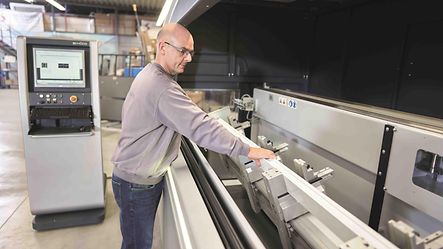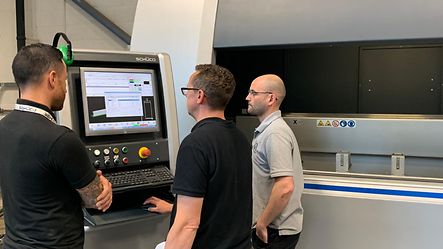Should you automate your fabrication workshop?
Stephen Greenall, Technical Engineer (Machinery) for Schüco UK & IRE explains what you need to know when you’re considering installing machinery in your fabrication workshop for the first time.

Taking the first steps towards automating your factory can be daunting. While we embrace technology to make our personal lives easier, it is often a harder decision to make in a workplace where there can be concerns about the perceived expense and threat of job losses.
The decision to install machinery is usually prompted by a desire to speed up production and improve quality. I work closely with fabricators installing new machinery, and training and supporting machine operators and take great satisfaction in helping businesses take their first steps on this journey.
Firstly, to address the worry that machinery means job losses: I have not found that to be the case. In fact, the reverse is often true. With repetitive tasks automated, the fabrication process becomes quicker which in turn means that production output can be increased. This can mean that more workers are required as more orders can be filled and the business grows.
Improving quality
Without the repetitive tasks that can be done by machine, fabricators may even achieve greater job satisfaction. Their role is to build doors and windows - and machines allow them to do just this.
Why ask a skilled worker to drill holes and cut profiles when that job could be done much quicker by a machine – and with much greater accuracy. For example, without tooling, drilling five holes could take a human around 30 minutes but a machine can do it in just one minute. With less room for human error, this also cuts down on delays.
The worker is then freed up to apply their fabrication skills to the actual assembly of the product. Often the quality of the finished product improves, not only because workers have time to greater care over the end result, but also because the accuracy of the machining and tooling means less chance of problems further down the line, thus alleviating risk.
Safety conditions in the factory can be improved by the addition of machines and automated tools too as they come with built-in safety features such as enclosures for blades, thereby minimising the risk of accidents.
Equip staff with knowledge and skills
Key to integrating machines successfully is making sure that all machine operators are well trained. That is why, at Schüco, we take the time to train customers to use our machines correctly and safely. All machines are also supplied with access to a free 24/7 support hotline.
Training isn’t only something to consider when new machines are installed but also when new staff are hired. The temptation is for existing staff to show the new team member how to use the machine, but businesses have a responsibility to ensure that anyone operating a machine has had the correct training.
We also offer refresher training and more advanced training for experienced operators to help them maximise the potential of the machine.
This ensures that standards remain high, the machine is maintained properly, and health and safety procedures are adhered to.

From design to end product
Schüco machines are highly versatile and can be programmed to process any supplier’s systems, not just Schüco, be they aluminium or steel. They will also interface with third party estimating and manufacturing software.
Automation can simplify the entire manufacturing process right from the design stage. Schüco CNC machines come with SchüCam software which can be downloaded on any laptop or PC as well as being accessible on the machine itself.
This means that drawings can be worked on away from the factory floor if required. When fabricating Schüco systems, SchüCal, the company’s configuration software, is also available.
At Schüco we are big advocates of automation as we believe it helps our fabricator partners to build their products to the highest standards and minimises their residual risk post-production. This not only supports us in maintaining our reputation for high-quality systems but also gives our partners the opportunity to evolve and grow their businesses.
Believe me, once you’ve made the leap, you won’t look back.